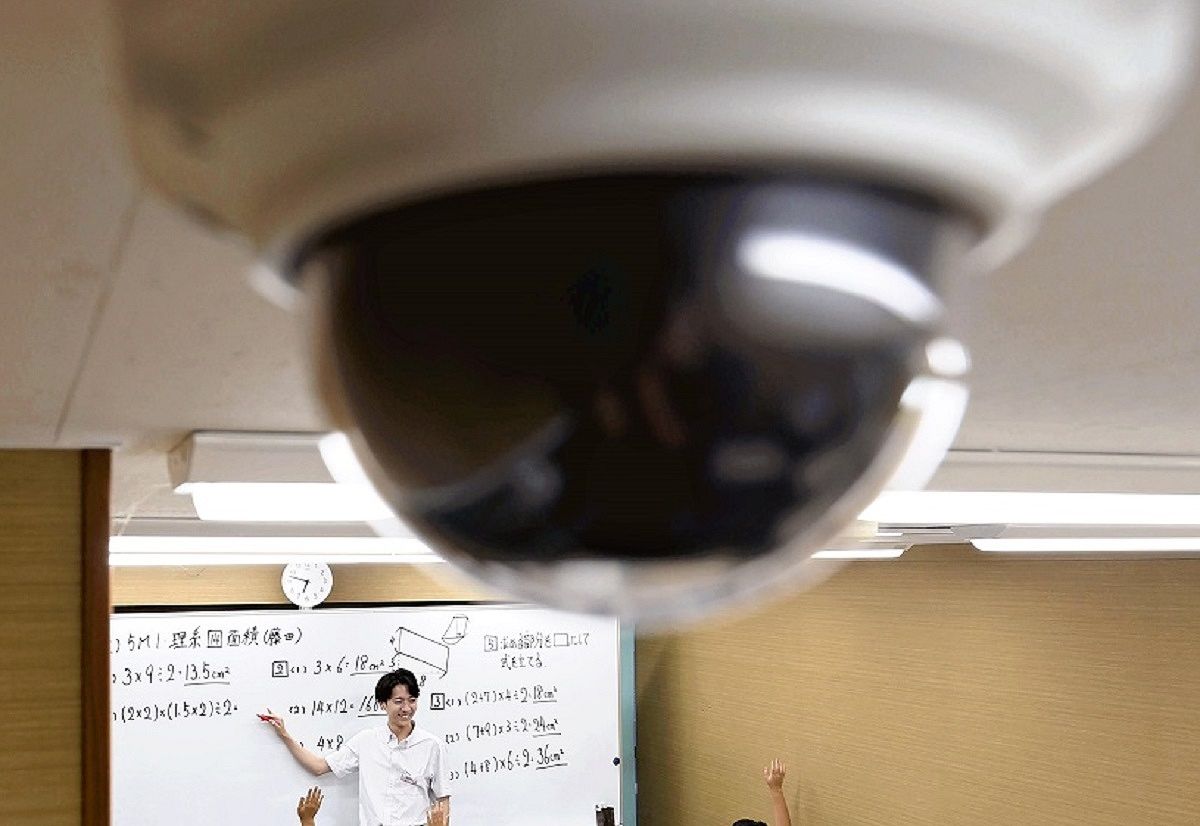Survey: 90% of Major Tutoring Operators Positive About Using DBS-Like Background Checks To Bar Sex Crime Offenders from Jobs

A tutoring school in Chofu, Tokyo, installed a security camera on the ceiling of a classroom where primary and junior high school students study.
17:31 JST, June 25, 2024
Nearly 90% of private tutoring school operators surveyed are positive about using a system that enables checking for sex crime records of current and prospective employees, according to a Yomiuri Shimbun survey.
The system, dubbed the Japanese version of Britain’s Disclosure and Barring Service (DBS), will establish a database of sex offense records to allow employers to check whether workers or prospective employees in jobs that involve close interaction with children have a history of sexual offenses or not.
Use of the system by the private sector will be voluntary.
The Yomiuri Shimbun conducted a survey on 50 major private companies operating tutoring schools to ask about the new system.
Of the 37 companies that responded to the survey, 32, or slightly less than 90%, were positive about using the system, and 20 companies hoped that it will be made mandatory for private businesses, too.
Under the system, employers check with the government whether or not people working in schools, tutoring schools and other workplaces involving children have sex crime records and restrict employment for those who have committed such criminal offenses.
The law on the prevention of sexual violence against children, which includes the establishment of the DBS-like system, was enacted on June 19. While schools and nursery schools are obliged to conduct checks, the use of the system by private businesses will be voluntary. The focus is now on how many private businesses to use the system.
The survey was conducted from late May to mid-June on 50 companies with the highest sales in the Shijyuku White Paper 2023 published by the Tokyo-based Zenkoku Shijyuku Joho Center.
Of the 37 companies that responded to the survey, nine said they would use the system, while 23 companies said they were considering it. A total of 32 respondents were positive about using the system, citing such reasons as: “Using the system will help students and their guardians feel safe and secure,” and “Checking for sex crime records of employees is necessary to judge whether they are suitable for their jobs or not.”
When asked their opinion about the voluntary use of the system by private businesses, 20 out of the 37 respondents said it should be made mandatory.
Many respondents said there is no difference in conducting educational activities between the public and private sectors, and those involved in educational activities are required to be responsible for their jobs, irrespective of their positions. It is impossible to prevent people with sex crime records from working near children if they are hired by private businesses that do not conduct a check via the system, prompting criticism that the voluntary aspect is a loophole.
Thirteen companies did not respond to the survey, with some saying, “We are currently considering how to deal with the issue,” and “We are still gathering information.”
The Yomiuri Shimbun also conducted a survey on 20 major private companies running swimming classes, English classes, music classes and after-school day care centers. Fourteen companies responded. Of them, 10 companies were positive about using the system, with one responding that it will use the system and nine are considering it.
Keiji Goto, lawyer and representative of Think Kids, a Tokyo-based nonprofit organization working to protect children from sex crimes and abuse, said: “I appreciate that many private businesses are positive about using the DBS. In order not to create a loophole in the system, the central government should continue to consider issues such as making it mandatory for private businesses to conduct DBS checks and extending the period for which sexual offense records can be checked.”
Top Articles in Politics
-

Japan PM Takaichi’s Cabinet Resigns en Masse
-

Sanae Takaichi Elected Prime Minister of Japan; Keeps All Cabinet Appointees from Previous Term
-

Japan’s Govt to Submit Road Map for Growth Strategy in March, PM Takaichi to Announce in Upcoming Policy Speech
-

LDP Wins Historic Landslide Victory
-

LDP Wins Landslide Victory, Secures Single-party Majority; Ruling Coalition with JIP Poised to Secure Over 300 seats (UPDATE 1)
JN ACCESS RANKING
-

Producer Behind Pop Group XG Arrested for Cocaine Possession
-

Japan PM Takaichi’s Cabinet Resigns en Masse
-

Man Infected with Measles Reportedly Dined at Restaurant in Tokyo Station
-

Israeli Ambassador to Japan Speaks about Japan’s Role in the Reconstruction of Gaza
-

Videos Plagiarized, Reposted with False Subtitles Claiming ‘Ryukyu Belongs to China’; Anti-China False Information Also Posted in Japan
























